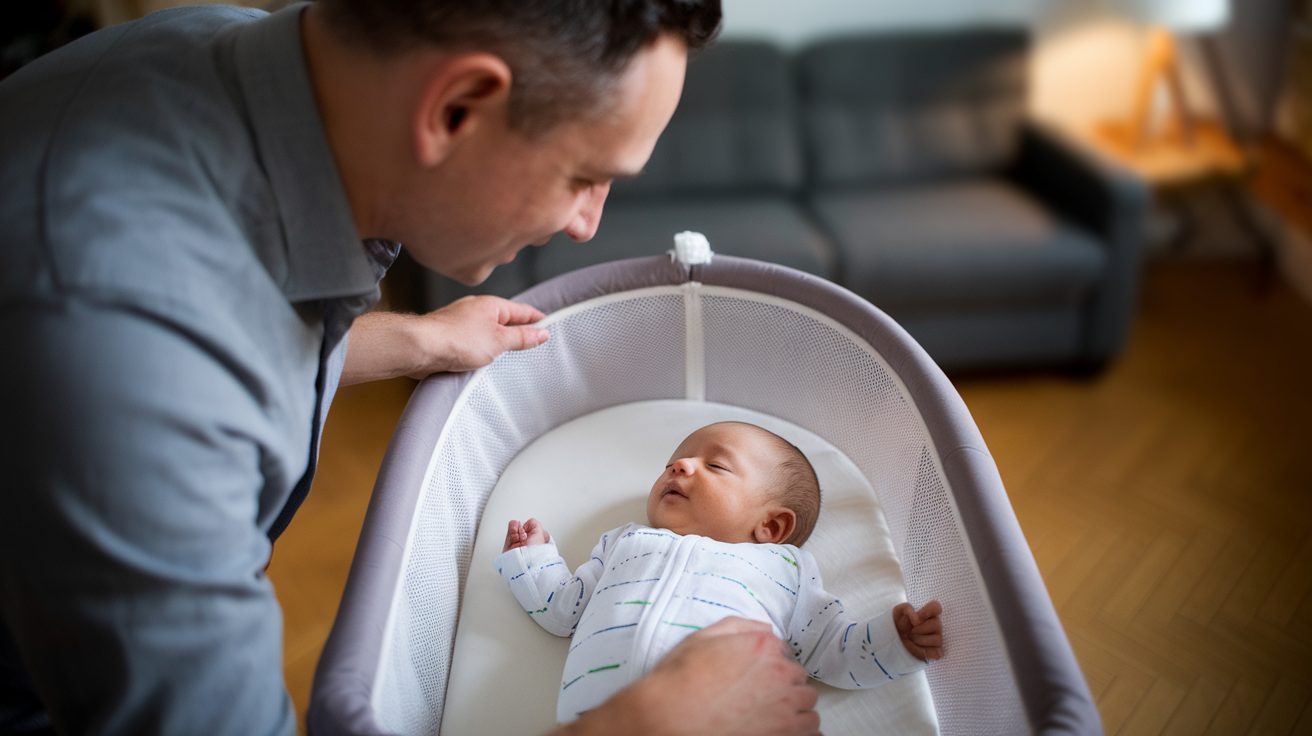Is your 10-month-old waking up after just 30 minutes of napping?
I know how hard it can be – you’ve barely had time to rest yourself when those little eyes pop open again.
As a sleep consultant, I’ve helped many parents through this exact situation. Short naps can leave you feeling stuck at home, watching the clock, and wondering if you’ll ever get a break.
They can affect your baby too, leading to a tired, fussy little one who struggles to sleep well at night.
But here’s the good news: you’re not alone, and there are clear reasons why your 10-month-old might be taking short naps.
Let me help you understand what’s happening and show you practical ways to help your baby sleep longer.
Why are Short Naps Common in Babies?
Every parent wants their baby to take long, peaceful naps, but the reality often looks different. Understanding why short naps happen can help you feel better about your baby’s sleep patterns.
A short nap typically lasts less than 50 minutes – that’s one sleep cycle for babies.
When your baby wakes up after just 30-45 minutes, they’re usually ending their first sleep cycle but haven’t learned to link to the next one yet. This is completely normal, especially for younger babies.
Let’s break down how naps work at different ages:
- Newborns to 4 months: Naps can last anywhere from 20 to 120 minutes, and this variation is perfectly normal
- 4-5 months: Babies start developing more regular nap patterns
- 5+ months: Naps begin to get longer and more regular as babies learn to connect sleep cycles
A longer nap usually means your baby has successfully moved from one sleep cycle to another, lasting 90 minutes or more.
This skill develops over time, just like crawling or walking. Some babies master it earlier, while others need more time – and both scenarios are fine.
When Do Babies Begin Taking Longer Naps?
3-4 Months
Your baby starts showing more regular sleep patterns. While naps might still vary between 30 minutes and 2 hours, you’ll begin to notice a more predictable schedule. At this age, babies usually take 4-5 naps per day.
4-5 Months
This is when naps often start getting longer. The morning nap is usually the first to lengthen, lasting between 45-90 minutes. Your baby might still take shorter naps later in the day.
5-6 Months
By now, you should see at least one nap lasting an hour or more. Most babies take 2-3 naps at this age, with the morning and early afternoon naps becoming more regular.
6-8 Months
The first two naps of the day should last about 1-2 hours each. The third nap (if your baby still takes one) is often shorter, acting as a brief rest before bedtime.
Remember that every baby develops at their own pace. While some babies naturally take longer naps early on, others might need more time to develop this skill. The key is consistency with your daily schedule and sleep routine.
Top Reasons Why Babies Take Short Naps
Understanding why your baby takes short naps is the first step to helping them sleep longer. Here are the main reasons behind brief naps:
1. Sleep Props and Helping Baby Fall Asleep
When babies are helped to sleep through rocking, feeding, or bouncing, they often wake up after one sleep cycle (30-45 minutes).
This happens because they expect the same help to fall back asleep between cycles. If your baby falls asleep in your arms and wakes up in their crib, they might become confused and have trouble continuing their nap.
2. Timing Matters
Your baby’s sleep schedule plays a big role in nap length. At 10 months, babies need about 2.5-3.5 hours of wake time between naps. If this timing is off:
- Too short wake windows: Your baby isn’t tired enough to sleep deeply
- Too long wake windows: Your baby becomes overtired, making it harder to stay asleep
3. Signs of Being Too Tired or Not Tired Enough
A tired baby might:
- Fight sleep
- Take short naps
- Wake up grumpy
- Show fussy behavior
4. Sleep Room Setup
Your baby’s sleep space can affect nap length. Key factors include:
- Room darkness (if you can see your hand, the room needs to be darker)
- Room temperature (slightly cool works best)
- Background noise (consistent white noise can help)
- Comfort (appropriate clothing and room temperature)
What Can Parents Do to Help Extend Short Naps?
Creating a Nap-time Routine
Just like bedtime, a simple nap routine tells your baby it’s time to sleep. Keep it short – about 8-10 minutes:
- Change diaper and put on sleep sack
- Dim the lights
- Read one short book
- Turn on white noise
- Close curtains
- Place baby in crib drowsy but awake
The Nap Hour Technique
If your baby is 5-6 months or older and wakes early from a nap:
- Leave them in their crib for the full hour
- Give them a chance to fall back asleep
- Offer brief comfort without picking up if needed
- Remember: even quiet rest time benefits your baby Note: This works best for the first two naps of the day
Watch Wake Windows
Getting the timing right makes a big difference:
- Track when your baby shows tired signs
- Plan activities during wake times
- Keep wake windows between 2.5-3.5 hours for 10-month-olds
- Don’t shorten wake windows after a short nap – this can create a cycle of brief naps
Remember: Consistency is key. It might take a week or two of following these steps before you see longer naps.
Final Thoughts
Remember, helping your baby take longer naps is a step-by-step process that requires patience. Some babies master long naps quickly, while others need more time – and that’s perfectly fine.
Focus on creating a consistent routine, watching your baby’s tired signs, and setting up a good sleep environment.
If you’re feeling worn out from short naps, know that this phase won’t last forever. Keep track of what works for your baby, adjust as needed, and celebrate small improvements.
Even extending one nap can make a big difference in your day.
Still have questions about your baby’s naps? Talk to your pediatrician about your concerns. They can offer personalized advice based on your baby’s specific needs and development.
Frequently Asked Questions (FAQs)
Why does my baby only nap for 30 minutes?
Short naps are common in younger babies due to their sleep cycle length. It can also be due to overstimulation, hunger, or difficulty transitioning between sleep cycles.
How do I get my baby to nap longer?
Ensure your baby is tired enough, has a consistent routine, and a comfortable, dark environment. Avoid overstimulation and help them link sleep cycles by offering a calm environment.
Can short naps be a sign of sleep regression?
Yes, short naps can happen during sleep regressions, especially when babies experience developmental changes, like learning new skills or transitioning to fewer naps.
What to do when my baby wakes up early from a nap?
Let your baby try to fall back asleep for 10–15 minutes. If they don’t, start the next wake window and avoid shortening it to prevent reinforcing short naps.













